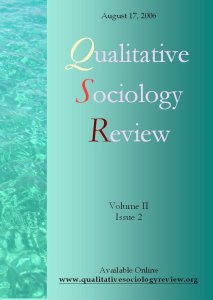Identifying with the Role of “Other”: “The Pink Triangle Experiment” Revisited
DOI:
https://doi.org/10.18778/1733-8077.2.2.05Keywords:
experiential learning, gay and lesbian, identity, identity management, stigma, self and society, social oppressionAbstract
The present study examines the impact of a politically-charged symbol on the everyday interactions of student-participants. Autoethnographic data gathered by undergraduate students donning a pink triangle pin indicates that participants often became identified with a gay/lesbian identity and were subsequently “othered.” Students’ testimonies highlight how the othering process prompted greater understanding of the struggles of gay men and lesbians, as well as other historically disenfranchised groups. Finally, their writings indicate that the experiment served as an exercise in self-reflection and in some cases, produced sentiments of self-empowerment.
Downloads
References
Aboud, Francis (1987) “The Development of Ethnic Self-Identification and Attitudes.” Pp. 32-55 in Children’s Ethnic Socialization edited by Phinney and Rotheram. Newbury Park, CA: Sage Publications.
Google Scholar
Brod, Harry and Michael Kaufman, editors (1987) The Making of Masculinities. Boston: Unwin Hyman.
Google Scholar
Chesler, Mark and Xûmena Zuniga (1991) “Dealing With Prejudice in the Classroom: The Pink Triangle Exercise.” Teaching Sociology 19: 19-22.
Google Scholar
DOI: https://doi.org/10.2307/1317848
Clifford, James (1998) The Predicament of Culture: Twentieth-Century Ethnography, Literature, and Art. Cambridge, MA: Harvard University Press.
Google Scholar
Clifford, James and George Marcus, editors (1996) Writing Culture: The Poetics and Politics of Ethnography. Berkeley, CA: University of California Press.
Google Scholar
Connell, Robert W. (1990) “An Iron Man: The Body and Some Contradictions of Hegemonic Masculinity.” Pp. 83-95 in Sport, Men, and the Gender Order,edited by M. A.Messner and D.F. Sabo Champaign, IL: Human Kinetics.
Google Scholar
Conzen, Kathleen N., David A. Gerber, Ewa Morawska, George E. Pozzetta and Rudolph J. Vecoli (1992) “The Invention of Ethnicity: A Perspective from the U.S.A.” Journal of American Ethnic History 12: 3-41.
Google Scholar
Cooley, Charles Ch. (1902/1983) Human Nature and the Social Order. New Brunswick, NJ: Transaction.
Google Scholar
D’Augelli, Anthony. (1994) “Identity Development and Sexual Orientation: Toward a Model of Lesbian, Gay, and Bisexual Development.” Pp. 312-333 in Human Diversity: Perspectives on People in Context edited byTrickett, Watts and Birman. San Francisco: Jossey-Bass.
Google Scholar
Denzin, Norman (1996) “The Epistemological Crisis in the Human Disciplines: Letting the Old Do the Work of the New.” Pp. 127-151 in Ethnography and Human Development, edited by R. Jessor, A. Colby, and R. Shweder. Chicago: University of Chicago Press.
Google Scholar
Ely, Robin J. (1995) “The Power of Demography: Women’s Social Constructions of Gender Identity at Work.” Academic Management Journal 38: 589-634.
Google Scholar
DOI: https://doi.org/10.5465/256740
Emerson, Robert M., Rachel I. Fretz and Linda L. Shaw (1995) Writing Ethnographic Fieldnotes. Chicago: University of Chicago Press.
Google Scholar
DOI: https://doi.org/10.7208/chicago/9780226206851.001.0001
Goffman, Erving (1959) The Presentation of Self in Everyday Life. New York: Doubleday.
Google Scholar
Goffman, Erving (1964) Stigma: Notes on the Management of Spoiled Identity. Englewood Cliffs, NJ: Prentice Hall.
Google Scholar
Goffman, Erving (1974) Frame Analysis: An Essay on the Organization of Experience. New York: Harper and Row.
Google Scholar
Helms, Janet E. (1990) Black and White Racial Identity: Theory, Research and Practice. Westport, CT: Greenwood.
Google Scholar
Helms, Janet E. (1992) A Race Is A Nice Thing To Have. Topeka, KS: Content Communications.
Google Scholar
Hughes, Diane (1997) “Racist Thinking and Thinking About Race: What Children Know About But Don’t Say.” Ethos: Journal of the Society For Psychological Anthropology 25: 117-125.
Google Scholar
DOI: https://doi.org/10.1525/eth.1997.25.1.117
Katz, Phyllis (1987) “Developmental and Social Processes in Ethnic Attitudes and Self-Identification.” Pp. 92-100 in Children’s Ethnic Socialization, edited by Phinney and Rotheram. Newbury Park, CA: Sage Publications.
Google Scholar
Kitzinger, Celia and Sue Wilkinson (1995) “Transitions From Heterosexuality to Lesbianism: The Discursive Production of Lesbian Identities.” Developmental Psychology 31: 95-104.
Google Scholar
DOI: https://doi.org/10.1037/0012-1649.31.1.95
Lopez, David and Yen Espiritu (1990) “Panethnicity in the United States: A Theoretical Framework.” Ethnic and Racial Studies 13:198-224.
Google Scholar
DOI: https://doi.org/10.1080/01419870.1990.9993669
Kimmel, Michael S. (1994) “Masculinity as Homophobia.” Pp. 119-141 in Theorizing Masculinities, edited by H. Brod and M.Kaufman. Thousand Oaks, CA: Sage.
Google Scholar
Mead, George H. (1934) Mind, Self, and Society From the Perspective of a Social Behvaviorist. Edited by Charles Morris. Chicago: University of Chicago Press.
Google Scholar
Nagel, Joane (1994) “Constructing Ethnicity: Creating and Recreating Ethnic Identity and Culture.” Social Problems 41: 152-176.
Google Scholar
DOI: https://doi.org/10.1525/sp.1994.41.1.03x0430n
Rabow, Jerome, Jill M. Stein, and Terri D. Conley (1999) “Teaching Social Justice and Encountering Society: The Pink Triangle Experiment.” Youth and Society 30: 483-514.
Google Scholar
DOI: https://doi.org/10.1177/0044118X99030004005
Thorne, Barrie (1993) Gender Play: Girls and Boys in School. New Brunswick. NJ: Rutgers University Press.
Google Scholar
West, Candace and Don Zimmerman (1987) “Doing Gender.” Gender and Society 1: 125-151.
Google Scholar
DOI: https://doi.org/10.1177/0891243287001002002
Downloads
Published
How to Cite
Issue
Section
License

This work is licensed under a Creative Commons Attribution-NonCommercial-NoDerivatives 4.0 International License.











